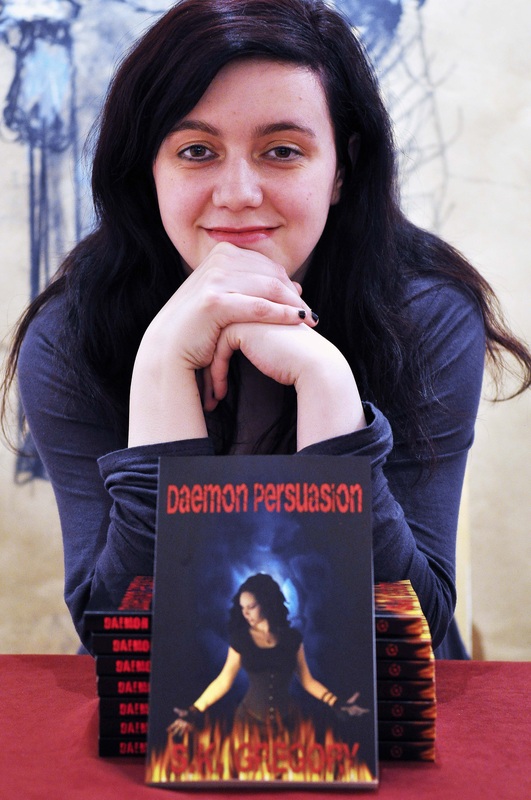|
Q1) Tell us about your book Æroreh is my gritty, mythpunk spin on the romantic tale of Sleeping Beauty, blending faerie magic and Celtic, Norse, and Anglo-Saxon pagan ritual with high technology. (Pronounced Aurora.) The "punk" in mythpunk is the dystopian element that subverts expected tropes (flips them on their head) and allows for more artsy storytelling, which I love. Instead of the Sleeping Beauty character being raised in seclusion, I have the prince hidden in the poor district until he comes of age, to protect him from "the evil queen" who wants his lineage wiped from Ealdspell. The "faerie blessings" are computer programs. Think of it as connecting to The Matrix, where you can suddenly learn Kung Fu. But, in this tale, it's a social commentary on oppressive views of women: gentle, meek, submissive, always has a sunny disposition . . . these "female virtues" taken directly from Sleeping Beauty in the Wood by Charles Perrault (The Tales of Mother Goose, 1800s). Q2) Why did you focus on myths/legends from that particular region? Faerie tales are my weakness. Especially faerie tales that are connected to mythology and legends. Sleeping Beauty, or "the sleeping princess" trope, is a tale that dates back to the Norse Prose Edda and Icelandic Volsunga Saga. But the trope regained popularity in the mid-1300's with Perceforest, a collection of French poetry connected to the Arthurian Legend. In this first recorded Sleeping Beauty tale, the princess, Zelladine, is Lancelot's great-great-great-grandmother. Perceforest inspired the Tale of Tales by Giambattista Basile and Sleeping Beauty in the Wood by Charles Perrault, in his Tales of Mother Goose collection in the 1600s. But the Brothers Grimm (1800s), being interested in German mythology mostly and experts in Teutonic myths (Norse Prose Edda and Icelandic Volsunga Saga), put as many story details and tropes in their Little Briar Rose back into their Norse and Icelandic mythological roots. The Disney version is a blend of Sleeping Beauty in the Wood and Little Briar Rose. It should also be noted that the Brothers Grimm are the first authors to make the faeries in the Sleeping Beauty story wise and helpful, as elves/faeries are revered so in German mythology Why the Celtic mythology inclusion? Well, the prince in Perceforest hailed from Scotland, though Troyous is not a Scottish name. The French didn't care about non-French names in the 14th century though. But Troyous is the only prince named in the Sleeping Beauty tales until Disney's Prince Philip, who was inspired by and named after the real Prince Philip, Duke of Edinburgh and husband to Queen Elizabeth II. Yes, yes, Prince Philip is not Scottish. I know. But I couldn't resist adding Celtic flavor to my Sleeping Beauty tale because of the "prince" connection from the first recorded version in the 1350's to the most popularized version today, from the 1950s. Especially since the Kingdom of Ealdspell, where this story takes place, is a collection of faerie tales rooted back into their Celtic, Norse, Germanic, and Anglo-Saxon origins. Q3) Who is your favorite mythical figure? The Gwenevere character from the Irish myths, the Ulster Cycle. In the Irish tales, Fionnabhar (translating to white faerie) is the daughter of Queen Maebh, the faerie queen. The Welsh borrowed that story and named her Gwenhwyfar (white fae). In both tales, she's an earth- and sovereignty-goddess, capable of warrior feats and magic. In Celtic myths, an earth- and sovereignty-goddess married the king to the land. And his reign as a king was directly related to the health of the land. If the land sickened (blight), then it was believed that the king was ill or ill-favored. To prevent this, it was imperative that the king marry a power faerie. The first Arthurian stories recorded are about Arthur and his faerie bride who marries him to the land. The French, and later the Victorians, turned Gwenevere into a figure of Courtly Love and later as a moral lesson to young women as to why you should never give into temptation. But her origins are badass. My friend and I wrote an entire series based on the Celtic origins of the Gwenevere character, The Knights of Caerleon. Q4) If you could choose to hang out with one mythical God, who would it be and why? I think this answer spins back to question three. Since Gwenhwyfar / Fionnabhair is a goddess, I would jump on any opportunity to hang out with her and learn the true Arthurian story. And, if not her, then The Morrígan of Irish and Welsh mythology. A triple sister goddess of war, death, and victory in battle first mentioned in the Irish Ulster Cycle. But also because she is the inspiration behind Morgana in the Arthurian Cycle stories. Q5) Do you plan on writing similar books in the future? Absolutely. I already have book 2 in The Ealdspell Cycle in the works, EIRWEN, which is my mythpunk spin on Snow White. The story largely pays homage to German and Norse mythology. Though, Eirwen is a welsh name that translates to "white as snow," it is a popular girl name in Scandinavian countries. The rust-hued factories, golden dust-colored sky, and sunset tones of the burn fields swirled together in Æroreh’s jostling vision. Somehow seeing the world upside down allowed her to gain a new perspective. The warm leaf-fall colors were always present, season after season. Was Rothlín stuck in a perpetual autumn? Only death with no promise of spring? Aisling was a life-giver. The goddess rose from the ashes of the Cold Winds to protect mothers and children and unwed maidens. Why would she allow a reaper’s plague after rising victorious from the grave? Even more strange were the weakening zaps of runic adjustments as she journeyed from Rothlín to The Wilds. Though, in their place, were tingly sensations, like a bubbling brook skipping over rocks. The energy demanded every sharp attention to detail . . . building, building, always building. A funny, fickle thing too. One moment she would experience a newness with gripping intensity only to forget every shred of feeling she had just swum in, each dogged or merry transition marked with a fit of giggles. As if she felt everything and nothing simultaneously and all her body could do was celebrate in response. The elf’s armor dug into her side as he carried her and yet she didn’t care about the pain, for the male had told her not to. Which resulted in more tingly sensations and more laughter. Whenever the elf suggested anything to her—notions that always seemed lovely, such as feeling no pain—the man they called Félip would materialize by her side with daggers in his eyes and lyrical poison in his voice, then fade into the shadows like dark mist. “Your protector doesn’t care much for me,” the elf would say. “Mortals and their tempers.” “My protector?” She would laugh at the silly thought. “Why would I need protection from you, kind sir?” “Indeed. Just think of all the fun we could have together.” Bubbly tingles had fizzed in her mind. “Are we running off to have fun?” she asked. “My mother will worry so.” Then she would laugh. A small part of her knew the elf meant something else entirely. Faerie struck? Did such a thing exist? She was uncertain though the word warbled in her head. Many notions warbled in her head, actually. Had she drunk more goblets of mulberry wine than proper? The world continued to tilt despite already being tilted herself. The Wilds tangled thicker with brush and trees the deeper they pressed into the faerie woods. Oranges, yellows, and reds remained. But somehow cleaner. Crisper. Leaves blushed fiery shades all around her and fluttered to the ground like wayward embers. And oh the music they made as they fell! Unlike the leaves in Rothlín who seemed to tra-la-la and reel about in the wind, the leaves here sang soul-haunting notes as their skeletal frames fell toward their graves. Tears burned her eyes and fell to join the leaves who now rested in peace. “Is he hurting ye?” The young man took shape before her eyes and she gasped at his sudden nearness. “Where does it hurt, lass?” “No, sir.” Her cheeks flushed under his inspection. Never had she wept, let alone before others, nor while hanging over the shoulder of a beautiful fae male in full armor. “I cry for the leaves as they sing their last song for the forest.” “What did I do now?” the elf asked. “Not speaking to ye, Dog Breath.” “Dalbréath, mortal.” The man they called Félip ignored the correction and pushed his dark brows together. “Ye can hear nature sing?” he asked her. “Shhhh, listen,” she admonished, biting back a tearful laugh. Her eyes closed as her ears filled with a thousand melodious emotions—the melancholy leaves singing their goodbyes, the bones of their brittle bodies being crushed beneath each set of boots, the wind frolicking through the trees, the ticklish giggles of moss. More tears escaped to fly free with the playful wind. When she opened her eyes, Félip was gone. He had dissolved into mere mist and shadow once more. Was he even real? Or perhaps a figment of her sluggish mind? “I am dreaming . . .” Another tear-stained laugh erupted from her body. The changing world continued to spin around her, faster and faster. The energy inside of her was building, building, ever building. Beautiful, angular faces blurred by while shouting commands. Boots stomped in chorus, like the beatings of a drum line. The tingling sensation in her mind spread out to each limb. Bubbles popped in her feet as she tapped the air to the march. Perhaps she should dance. Yes, the forest wants me to dance for her. “Put me down, kind sir.” “Not until we reach Leaf Curl,” the elf answered. Dalbréath, was that his name? “My feet must touch earth. The wind beckons me to twirl with the dying leaves.” The elf slowed and then she heard mercurial voices—hot, cold, rising and falling in pitch and passion. She could have focused on their words, but her heart was still too full of the sorrows and laughter all around her to fully listen. A couple words bled through, “madness” and “rune sickness.” They were meaningless words. She needed their conversation to swell with music too. Anger simmered low in her belly. How dare they deny her music? “I demand you release me!” she shouted. “I need to dance!” Dalbréath lowered her to the forest floor, his eyes wide. With fear? With humor? She couldn’t tell. The moment the toes of her boots caressed leaf litter and black earth, her body leaped away. She bowed before a female and laughed. Then curtsied before two males. The wind whispered encouragement to frolic, and so she did. The trees swayed under the melody of life. The leaves sang their haunting notes until they crashed to their death. Faeries laughed all around her, some even encouraged her to dance harder. She dipped, twirled, leaped—building, building, building—all the while her body grew more fevered. Music played in her veins and beat in her heart. Sweat beaded on her forehead. White-blonde strands fell loose from their braided crown and flew around her face in a sticky mess. She clutched at the pink roses in her hair and threw them around the forest as though petals in a parade. Breath came quick, ragged. She gulped heaving lungfuls of air as though drowning. Still she dipped, twirled, and leaped. Still the faeries laughed and encouraged her on. She couldn’t stop dancing. She didn’t want to stop dancing. Even though her stomach grew sick and her body trembled with weakness. “Songbird,” the young man snapped from behind. She spun in a twirl of melodious laughter toward him. “Ye need to rest yer feet before they blister.” “Let her dance!” a faerie tossed out. “Shut yer ugly trap,” the young man shot back. Daggers reappeared in his dark gaze. “She’ll dance until she dies.” Æroreh spun around, her arms out wide, the young man’s face moving in and out of view. “Then let me die content!” “The palace guards are still chasing our trail. We need to run.” Unable to resist the urge, she grabbed his hands and pulled him into a dance. “Do you feel life sing? Isn’t it heartbreaking and beautiful?” “Yer having a withdrawal,” he said softly, staring at their joined hands as if stricken. “Sick in the head without the hag’s runes—” “I am not sick!” she screamed at him. “Do not mock me!” The young man clenched his jaw and lowered his eyes, then whispered, “Dance with me?” “Feel life’s heartbeat, Félip Batten.” How did she remember his name? By the look on his face, he was just as astonished as she. But never mind. She placed his hands on her waist and he sucked in a sharp breath. “Now listen to the music.” Their bodies began to move and she hummed in delight the melody crescendoing all around her. A dance partner! And a handsome one too. They spun beneath the boughs of a tree and then another. He set their rhythm, a far slower one than she expected, but still he kept in tempo with the song she hummed. A song that was building, building, building. His fingers splayed across her lower back as his hold tightened on her waist. At his touch, her knees wobbled a step, and then another. This was her first dance with a man, and a stranger to her no less. An odd cloak that reflected the forest covered his upper body. Though a sturdy garment, glimpses of bare skin still peeked through as they moved. She forced her eyes upward. Dirt smudged part of his cheek, just above a scar. The injury ran the length of his jaw, ending by full lips and a chin with a slight cleft. A smattering of faint freckles spilled across his nose. Russet brown hair hung in thick waves over his eyes, the very same dark eyes now meeting her curious gaze. He seemed curious of her too, openly staring for several movements of time, and yet he didn’t smile. Rather, the corners of his mouth dipped in a frown. Why did everyone frown at her as of late? And why was he scarred? “Do I not please you?” she asked, feeling tears form once more. Crying was an odd response to feelings when smiling was more convenient and less messy, she decided. But there were far too many emotions, perhaps even more than the grains of sand along Rothlín’s coastal shores. Some feelings she didn’t even know by name. She lifted her finger and touched the corner of his mouth where he frowned. “I was made to bring others joy.” His sigh brushed along her cheek as his steps slowed even more. Gently he moved his face away from her touch. “What makes ye happy? Besides dancing and music?” Building, building, building . . . “I . . .” She tilted her head. A great many things made her happy, she was sure of it. A memory surfaced, despite the thoughts spinning faster than a wheel, despite the throbbing pain bleating in her head. Songbird. He called her songbird. She did please him. Gratitude swelled in her chest and she smiled. “Making other people happy is my joy. Especially when I please . . .” The words trailed off when her chest tightened with a familiar ache. A knowing. A pull toward something forbidden. Something entirely selfish. The goddess would surely disapprove. “You . . . you do not like to touch others, do you?” “Only danced with me mither—” “—I wanted to dance! Is it so wrong to please myself?” Félip let go of her waist but didn’t step away. “Aye, please yerself, Æroreh. Naething wrong with that.” “You are not mad at me?” “No, lass.” Félip leaned in close and whispered, “Forgive me, but ye look like ye swallowed a coal furnace.” “I feel all wrong inside,” she whispered back. “The goddess has left me.” The hard lines of Félip’s face softened. “Yer experiencing rune withdrawals. Faerie Madness, some call it. Yer inhibitions are dimmed and feelings are more raw. Thoughts too.” Sweat dripped down her forehead. “The music, I . . . I can’t hear the forest sing—” The world tilted once more and, this time, her legs gave way. And then she was falling, like a leaf. She clawed through the air for the young man, not ready to go to her grave. Strong arms caught her body before she hit the ground. Voices echoed and scraped in her ears. She grimaced as she curled up around her middle. Then air—blessed air—floated over her skin as her body moved through the forest, her face pressed to a warm chest. Everything hurt—her head, her legs and feet, her stomach, her heart. She wasn’t experiencing withdrawals. No, she knew exactly what was wrong. “Blight Rot,” she murmured while playing with the strings of a cloak. The arms carrying her tightened as steps faltered. Her mother would surely never wish her return now. She was ruined Copyright 2020 Forest Tales Publishing BIO:
JESIKAH SUNDIN is a multi-award winning Dystopian Punk Lit, Fairy Tale, and Historical Fantasy writer, a mom of three nerdlets, a faeriecore and elfpunk geek, tree hugger, nature photographer, and helpless romantic who married her high school sweetheart. In addition to her family, she shares her home in Monroe, Washington with a rambunctious husky-chi, a red-footed tortoise, and a collection of Doc Martens boots. She is addicted to coffee, laughing, and cheese . . . Oh! And the forest is her happy place. Comments are closed.
|
Monthly Newsletter
Categories
About the Author:S. K. Gregory is an author, editor and blogger. She currently resides in Northern Ireland. “Description begins in the writer’s imagination, but should finish in the reader’s.” Archives
July 2024
Categories |
||||||||||||||||||||||||||||||||||||||||||||||||||||||
© 2024 S.K. Gregory
Proudly powered by Weebly

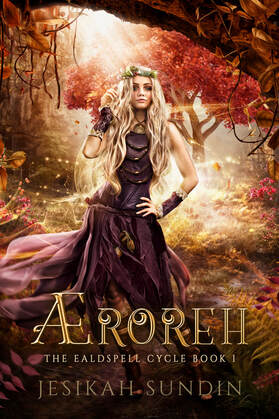
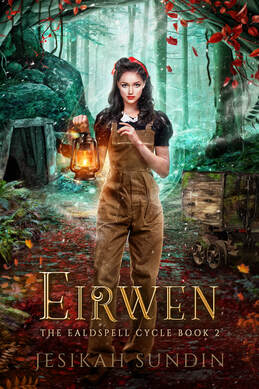
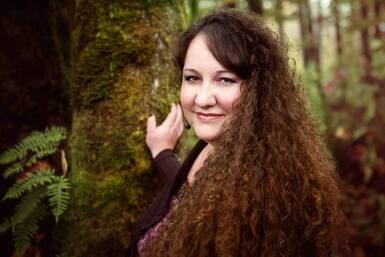


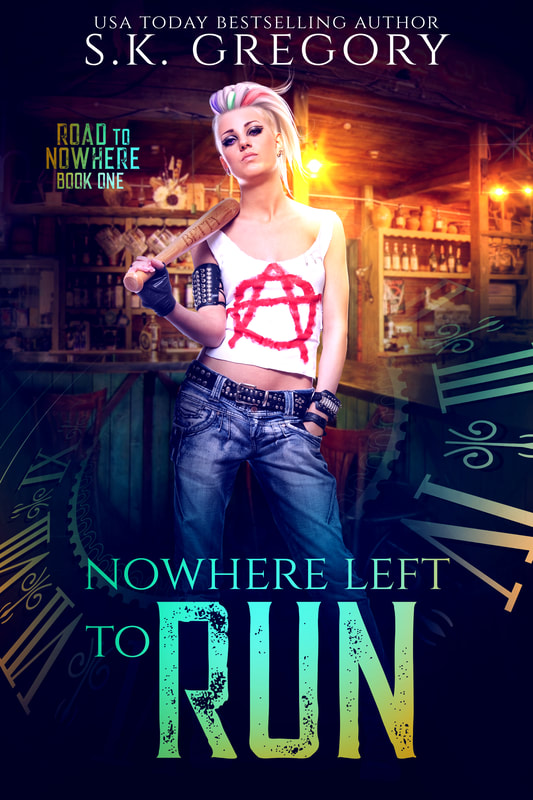

 RSS Feed
RSS Feed

